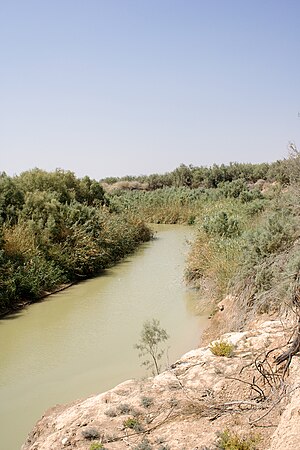 Image via Wikipedia
Image via WikipediaA few years ago, when my Dad was hospitalized with severe cardiovascular complaints, we encouraged him to fight his ailment by assisting him in planning an elaborate trip to Prince Edward Island. We discussed the modifications that he would need to make to his RV, the various point of interest along the way, the best time of year to go, etc. I firmly believe that his recovery from a quadruple by-pass was greatly helped by keeping his hope for the future alive and by giving him a vision of the future.
In Deuteronomy, as Moses gave his last impassioned address to a nation about to enter the land of Canaan, the Promised Land, he continued to build on a vision he received from God and desired to actualize in the hearts of Israel.
Almost inexplicably, Moses instructed Israel about the location where the Feasts of the Lord, introduced in Leviticus, were to be observed. Only in Deuteronomy was their observance first associated with “the place the Lord will choose as a dwelling for His Name” .Moses stated that to celebrate the Passover, each Israelite family had to sacrifice a lamb “at the place the Lord will choose as a dwelling for His Name” (Deut. 16:2). Then Moses gave an injunction against sacrificing the Passover lamb in any of the towns in which they live. It could only be sacrificed in the place the Lord will choose.
The Feast of Weeks was to be celebrated with rejoicing “at the place God will choose as a dwelling for His Name” (Deut. 16:11). Then the Feast of Tabernacles (Sukkot) was to be celebrated with great joy “at the place the Lord will choose” (Deut. 16:16). During Sukkot, Israel was commanded to be joyful because “the Lord your God will bless you in all your harvest and in all the work of your hands, and your joy will be complete.” (Deut 16:15)
All of this was being told to Israel while they were still camping in the desert, east of the Jordan. The land they saw across the Jordan River was still occupied by the Amalekites, the Hittites, the Jebusites, and the Amorites, who terrified Israel thirty eight years earlier. Essentially, Moses was telling a frightened group of people that as far as God was concerned their battles with the denizens of Canaan were over and victorious. God wanted them to see that He had a bigger plan for the nation which included choosing a place in the land of Canaan in which to build a dwelling for His Name. The Lord wanted Israel to fully understand that He intended to live in their midst.
While Moses only introduced the idea that the Lord would choose a place for His Name in Deut. 12, in these three chapters, this idea is accelerated, repeated several times. I suspect that the people of Israel could better face the battles ahead of them if they were fully assured that God not only stood by them but also had plans for them beyond just giving them the land. Israel had yet to fight a single battle. But before crossing the Jordan, they had to be resolved that God Himself would fight for them and that he would go ahead of them. Hearing of God’s plans for their future enabled Israel to confidently tackle the obstacles facing them.

No comments:
Post a Comment